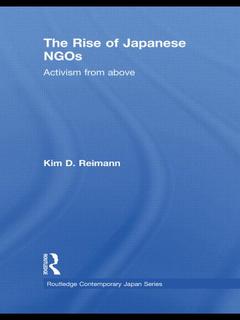Description
The Rise of Japanese NGOs
Activism from Above
Routledge Contemporary Japan Series
Author: Reimann Kim D.
Language: English
Subject for The Rise of Japanese NGOs:
Keywords
NGO Formation; international; NGO Sector; political; Domestic POS; opportunities; International Political Opportunities; transnational; Public Interest Corporation; diffusion; Civil Society; domestic; NGO Activism; pos; NGO Participation; advocacy; International Development NGOs; support; Advocacy NGOs; program; MOF Official; Agency NGO; Japanese NGOs; NGO Fund; Nonprofit Organizations; Nonprofit; NGO Project; JATAN; Civil Society Support Programs; ADB Meeting; Oda Reform; NPO Law; International Political Factors; Mekong Watch; Rockefeller Brothers Fund
Publication date: 10-2011
Support: Print on demand
Approximative price 172.36 €
Subject to availability at the publisher.
Add to cartPublication date: 11-2009
· 15.6x23.4 cm · Hardback
Description
/li>Contents
/li>Readership
/li>Biography
/li>
Over the past two decades, non-governmental organizations (NGOs) have exploded in number and emerged as a new force in international and transnational politics. Why, however, do some countries nonetheless have more active NGO sectors than others?
Using the case of Japan, this book uncovers patterns of convergence and divergence in levels of activism across industrialized countries and offers a two-level political explanation for the rise of NGOs as a global phenomenon. The author argues that activism has been cultivated from "above" and shows the ways in which political structures and processes at the domestic and international level have either encouraged or discouraged activism. Japan, a late developer in terms of its number of NGOs, provided a poor political environment for NGO activism for most of the post-war period. In the past two decades, however, as this situation has changed, NGOs have become a visible player as both critics and partners of the government.. Using the concepts of international political opportunity, norm socialization and transnational diffusion, Reimann traces the ways in which domestic and international politics interact and promote the rise of NGOs globally.
This book will be of interest to postgraduate students and academics working in political science, international relations, sociology, policy studies, Asian studies, international development and environmental politics.
1. Introduction: Activism from Above 2. States and the Domestic Political Economy of NGOs 3. Political Globalization, "Civil Society" Politics and the Global Growth of NGOs in the 1980s-2000s 4. International Development NGOs in Japan 5. Sustainable Development and Advocacy NGOs in Japan 6. Conclusion: States, Political Globalization and the Growth of NGOs
Kim Reimann is an Associate Professor in the Department of Political Science, Georgia State University.




